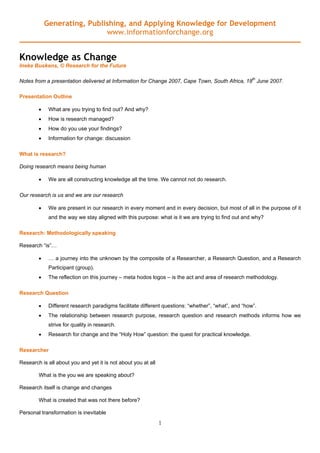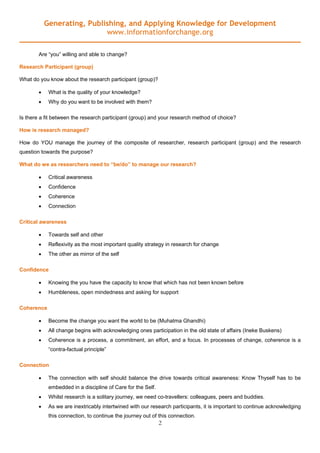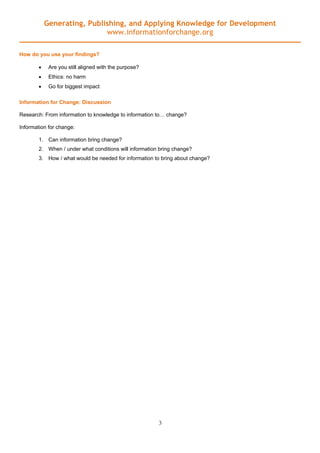Knowledge as Change
- 1. Generating, Publishing, and Applying Knowledge for Development www.informationforchange.org Knowledge as Change Ineke Buskens, ÂĐ Research for the Future Notes from a presentation delivered at Information for Change 2007, Cape Town, South Africa, 18th June 2007. Presentation Outline âĒ What are you trying to find out? And why? âĒ How is research managed? âĒ How do you use your findings? âĒ Information for change: discussion What is research? Doing research means being human âĒ We are all constructing knowledge all the time. We cannot not do research. Our research is us and we are our research âĒ We are present in our research in every moment and in every decision, but most of all in the purpose of it and the way we stay aligned with this purpose: what is it we are trying to find out and why? Research: Methodologically speaking Research âisââĶ âĒ âĶ a journey into the unknown by the composite of a Researcher, a Research Question, and a Research Participant (group). âĒ The reflection on this journey â meta hodos logos â is the act and area of research methodology. Research Question âĒ Different research paradigms facilitate different questions: âwhetherâ, âwhatâ, and âhowâ. âĒ The relationship between research purpose, research question and research methods informs how we strive for quality in research. âĒ Research for change and the âHoly Howâ question: the quest for practical knowledge. Researcher Research is all about you and yet it is not about you at all What is the you we are speaking about? Research itself is change and changes What is created that was not there before? Personal transformation is inevitable 1
- 2. Generating, Publishing, and Applying Knowledge for Development www.informationforchange.org Are âyouâ willing and able to change? Research Participant (group) What do you know about the research participant (group)? âĒ What is the quality of your knowledge? âĒ Why do you want to be involved with them? Is there a fit between the research participant (group) and your research method of choice? How is research managed? How do YOU manage the journey of the composite of researcher, research participant (group) and the research question towards the purpose? What do we as researchers need to âbe/doâ to manage our research? âĒ Critical awareness âĒ Confidence âĒ Coherence âĒ Connection Critical awareness âĒ Towards self and other âĒ Reflexivity as the most important quality strategy in research for change âĒ The other as mirror of the self Confidence âĒ Knowing the you have the capacity to know that which has not been known before âĒ Humbleness, open mindedness and asking for support Coherence âĒ Become the change you want the world to be (Muhatma Ghandhi) âĒ All change begins with acknowledging ones participation in the old state of affairs (Ineke Buskens) âĒ Coherence is a process, a commitment, an effort, and a focus. In processes of change, coherence is a âcontra-factual principleâ Connection âĒ The connection with self should balance the drive towards critical awareness: Know Thyself has to be embedded in a discipline of Care for the Self. âĒ Whilst research is a solitary journey, we need co-travellers: colleagues, peers and buddies. âĒ As we are inextricably intertwined with our research participants, it is important to continue acknowledging this connection, to continue the journey out of this connection. 2
- 3. Generating, Publishing, and Applying Knowledge for Development www.informationforchange.org How do you use your findings? âĒ Are you still aligned with the purpose? âĒ Ethics: no harm âĒ Go for biggest impact Information for Change: Discussion Research: From information to knowledge to information toâĶ change? Information for change: 1. Can information bring change? 2. When / under what conditions will information bring change? 3. How / what would be needed for information to bring about change? 3



